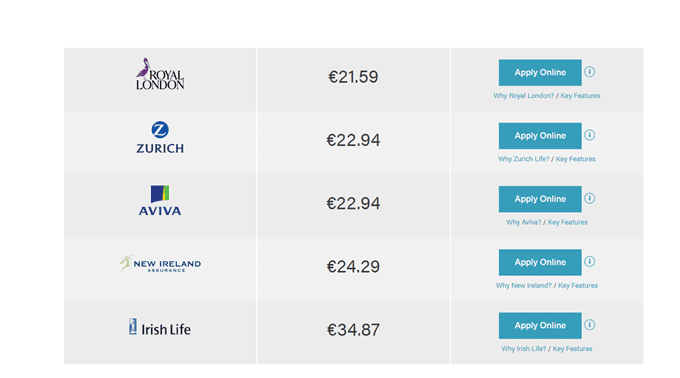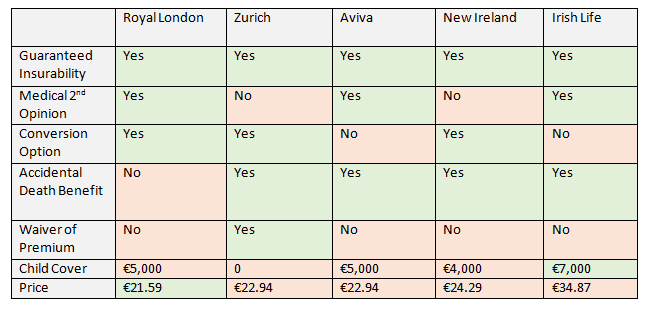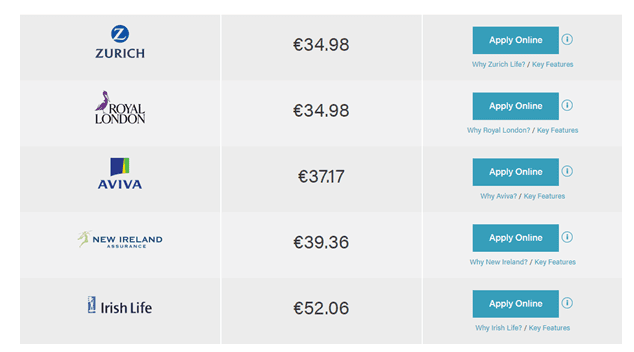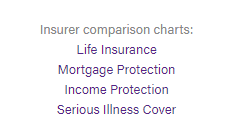

Listen to the intro:
Friends, not all Mortgage Protection insurance policies are created equal.
Especially not the one your bank offers you.
And I get the appeal; I do. Buying a house, as we all know, is a pain in the hole as it involves any number of the following:
No wonder you might be tempted to say ‘feck it and go with your bank when they offer you a Mortgage Protection policy.
If you do, however, you’ll lose out on MUCHO MOOLAH – and, sure, look, you’ve made it this far; don’t fall for the bank’s cheap tricks.
See, banks are usually tied to one insurer, meaning you’re only getting policy choices from one place. You wouldn’t shop in a supermarket offering only one brand (Cadbury’s Mushroom Soup, anyone), so don’t do it for your mortgage protection.
So, to avoid a bad case of buyer’s remorse, today I’m going to help you choose the best Mortgage Protection policy FOR YOU!
As always, the caveat applies that no two people are the same, so no two policies should be the same. Instead, use this blog post to find out what’s important to you and go from there.


Well, this is going to be obvious, but: any policies will pay off your mortgage (to the bank) when you die.
All the insurers also have a reasonably similar batting average in that they all pay around 98% of all death claims.
This means: with all of them; once you’re insured, your mortgage will be paid off if you die. Presuming you haven’t done something silly like tell a whopping lie on your application that’ll get your claim invalidated.
I’m looking at you social smokers who pretend they don’t smoke.
Once you get past the raison d’etre (ooh la la) for Mortgage Protection, you’ll find loads of other bits tacked on, although they’re not as important as the actual cover. Still, they can be pretty useful, depending on your situation.
Many of them are a bit meh: for example, the maximum term you can get. Irish Life offers a 50-year term, while the other four (Aviva, New Ireland, Royal London, and Zurich) provide a standard 40-year term. This is relevant if you’re particularly young taking out the policy, but it isn’t a big concern for most of you.
Likewise, a minimum term length exists – ranging from two years (Aviva and Irish Life) up to five years for the others.
Another is called Maximum Age at Entry Conversion, which sounds a bit like a course you might do to get more in touch with the world’s energies or some other bullshit.
All of this will likely seem unclear – and you probably think that none of it seems that important.
And honestly, for most people, you’d be right. However, there are about seven bits and pieces that are worth considering.
Remember, if you go with your bank here, you only see one side of the insurer’s pentagon. Not to be confused with a pentagram, which symbolises all the young wans in black running around in fields with crystals and casting spells.
We all have that one cousin.

So without further ado…
If you’re in perfect health, you can choose any insurer.
Truthfully, I rarely see an application that doesn’t have some health condition or family history of a health issue. In that case, choosing the insurer most sympathetic to your situation is the most important thing. Forget about the bells and whistles. Finding an insurer who will offer you coverage at the lowest price with the least hassle would be best.
That’s where we come in. We’re the experts if you have a pre-existing condition.
You should first complete this medical questionnaire so I can find you the most suitable insurer.
This little bad boy is the dirty secret of insurance. Most people end up with a joint policy, which pays out on the first death only. Dual Mortgage Protection pays out on both. That’s two payments. The bank would get the first payment to clear the mortgage; the second would go to your family.
It’s an excellent way of getting Life Insurance for cheap, basically.
If someone tries to peddle a joint policy – run, ar nós an gaoithe (like the wind, for my non-Irish speaking friends, which probably also includes most Irish people reading!)
A conversion option is fantastic.
There, I said it.
It’s great because it lets you add years to your cover without answering medical questions…which probably doesn’t make much sense on its own.
So: example.
Jim is 40 and has 20 years left on his mortgage. Fifteen years later, he’s near the end of his term, and his mortgage is pretty much paid off. However, he’s 55 now and has a dodgy ticker.
However, he has a conversion option, so now he can turn his MP policy into a Life Insurance policy. WITHOUT having to disclose the dodgy ticker, which would otherwise cost him a price hike.
Sound.
New Ireland, Royal London, and Zurich offer a conversion option on their mortgage protection. Aviva and Irish Life do not.
This one is important, so keep an eye on it when deciding.
For me, New Ireland is the winner here. Let’s say Jim initially took out a policy for €300k but only has €50k left. New Ireland will offer him a new plan for €300k; the others will only give him €50k.
Unless you’re older when applying. If so, choose Zurich Life, as they will allow you to convert your policy to your 87th birthday, no questions asked. With Royal London, you have to be under 70; with New Ireland, you have to be under 65.
NB: You will pay a few euros more to add the conversion option (roughly 5% extra), but it’s well worth it.
Guaranteed insurability sounds fancy, but I’ll break it down for you. It’s a second chance saloon that lets you increase your coverage on special occasions without answering health questions.
The special occasions include:
Let’s say you’re 30 and fancy-free when you get your Mortgage Protection the first time around.
Fast forward ten years, you’ve had a kid and decided to move to a bigger house and mortgage. You’re now 40, have put on a few pounds, and your cholesterol is raised, as is your BP, but apart from that, you’re grand!
Typically, if you reapplied for cover, you might face a loading because of those new health issues.
However, because of guaranteed insurability, you can increase your coverage by up to 100 grand or 50 per cent of your original coverage without having to answer health questions.
Which is pretty sweet, let’s be real.
Aviva is slightly different here because it lets you increase your cover by €40,000 only when getting a new mortgage. But they also allow you to extend the term to be the same as the new mortgage. SOUND!
Guaranteed insurability is a great way to increase your coverage without worrying about a significant price increase as you get older/start falling apart.
This is also a biggie.
Zurich will pay your premiums if you’re injured or too ill to work for more than 13 weeks.
This isn’t a huge help if you’re only paying a tenner a month, though it could be worth it if you have a hefty premium (say €150 a month). That way, you can keep your insurance and spend €150 on something else, like food or the mortgage.
The other insurers don’t offer it.
It will come in handy if you’re someone recently diagnosed with a medical condition.
Essentially, it lets you double-check your diagnosis or the treatment you’re on. An independent medic will look into any alternatives or see what other options you have if you’re not getting better.
Plus, it’s a free add-on and is available to your children, your parents, your partner and their parents.
Aviva’s Best Doctor is top of the class here:
They also have Family Care, a counselling and support system that covers short-term counselling and carer support services. If you’re someone who might benefit from either, it’s a big plus for Aviva, so weigh that up when choosing between policies and considering the costs.
Remember, it’s not just about the insurance cost – but about the added value of the extras.
Royal London offers Helping Hand Benefit.
Irish Life has Medcare
Unfortunately, Zurich and New Ireland offer nada.
This one is kind of funny.
So let’s say you’ve JUST filed the papers for your insurance, but it hasn’t come through yet. You’re in insurance limbo, not knowing if you’re covered.
And then something tragic happens.
A vat of beer in a nearby brewery explodes, and you’re swept away and perish.
(This is based on actual events. Google ‘the London Beer Flood’.)
Technically you’re not covered, but if you have an Accidental Death Benefit, you’re automatically covered for up to €150,000 should you die in an accident.
All the insurers offer it except for Royal London.
This benefit is worth considering if you think there will be a long wait for medical reports.
As a dad, I know this one is grim.
But it’s there as a consideration.
If one of your kids were to die (I know: it’s awful!), you get a lump sum from the insurer. Zurich Life has no children’s cover, while Irish Life has up to €7,000 cover.
Royal London will strictly not pay out on a death claim if a child is younger than three months when they pass which I think is abhorrent.
Irish Life is the only insurer that will pay a death claim from birth.
If you forget/can’t make a payment and your policy is cancelled, the insurer allows you to pay the arrears within a certain time. If you do, they’ll put you back on the cover or even pay out if a death had occurred when premiums were missed.
This one is gas.
So let’s say you’re getting a mortgage with someone you’re unsure about. Maybe it’s grand, but you don’t know if ‘grand’ is enough for you.
Separation Cover would let you cover your bases. Basically, if needs must, you have an out on a joint policy where you can split it into two single plans, without having to answer any medical questions.
A consideration if you don’t think your relationship will outlast your mortgage.
That one is on you, buckaroo.
Here the insurer agrees to clear the outstanding balance on your mortgage regardless of interest rates.
Yeah, I bet you didn’t know this was a thing you might have to worry about.
Without this guarantee, there might be a balance leftover to be paid (if your mortgage interest rate creeps above 6 per cent) before your bank officially gives your other half/family the house.
And last but not least.
I talk to a lot of people about insurance. It’s my job. For many, it comes down to price—a simple comparison of policy a vs b or c or d.
Let’s look at Jim again. He’s 40 and in decent health and wants to get €300,000 cover for the 25-year term of his mortgage.
His options, from my magical quote machine, look like this:


Except for Irish Life, there’s only a couple of euros in the difference. So this is how it falls, all in:


For my money, look out for:
A quick refresher in case you skipped all of the above!
Mortgage Protection is the type of insurance you need when buying a house. It pays off your mortgage if you die.
Now, let’s start with an example to help make this real.
Jesse is 34 and buying a house with his partner. Jesse really likes CrossFit, because who doesn’t (amirite)?
His mortgage is €350,000, and he wants to pay monthly for the 30-year term of his mortgage.
Jesse doesn’t smoke (his body is a temple; I don’t know if you heard, if you haven’t, he’ll tell you soon, but he does CrossFit), and neither does his partner (they’d love to smoke, but because Jesse does CrossFit – there’d be murders over smoking).
He goes to the most useful online broker and finds the following quote:


Jesse’s first thought is probably that it’s between Zurich and Royal London and that Irish Life is robbing feckers, bleeding their customers dry of that extra €17 a month.
So does Jake take the path of least resistance and become a Zurich Lifer?
Should he?
The crucial thing to remember is that you’re not just paying for Mortgage Protection. There’s also a bunch of other stuff included. So let’s look at what the various insurers offer for your hard-earned.
Pro-tip: you can see all this information yourself when you get a quote – simply scroll down to the comparison charts.


1. Aviva
I don’t think people understand how valuable this is.
If you have a health condition, you can request Best Doctors to review your medical reports to make sure your treatment is the best available.
If you’re diagnosed with an illness in the future, you’ll have questions.
What happens now?
What are the treatment options?
Is the diagnosis correct?
Step one. The confidential process starts the moment you call Best Doctors. A nurse or medical team performs an intake interview and collects all of your relevant medical details, helping you to formulate the questions you want to ask to the specialist. The Best Doctors team supports you throughout the whole process.
Step two. With this information, Best Doctors collect all your medical files and tests and then select the international world class specialist from a network that is best suited to review your case.
Step three. The specialist carries out a thorough review of your medical information and creates a comprehensive report to review the diagnosis. Furthermore, the specialist will come up with suggestions for the best possible treatment and will answer all your questions.
Step four. The Best Doctors nurse causes you to go over the findings in depth before sending you the report in English. We encourage you to share the information with your current treating doctor to discuss the next steps in hand.
Step five. Best Doctors will be available at all times for any questions that may arise after reading your report with your treating doctor. When it comes to your health, you need certainty and reassurance and Best Doctors is here to support you.
2. Zurich
5. Irish Life
6. Royal London
With all that in mind, what you do will depend on your circumstances and any other insurance policies you might have. As you can see from this big ole list, it can get confusing with lots, plusses, and minuses.
However, I stand by my advice: take a look at the cost first. Then look at the list of benefits and choose the ones that you think are important—rank them by most relevant. From there, scroll back up and see who comes out on top.
If your brain starts to melt out of your ears, you can fill in this short form or give me a buzz at 057 93 20836, and I’ll get back to you with my thoughts!
Thanks for getting this far.
Nick
PS: This blog took AGES as it’s pretty comprehensive so PLEASE feel free to share with your friends or on your socials. TYVM!
As Ireland's leading life insurance broker, we specialise in comparing the rates and policies from the top five Irish life insurance providers and offering the very best value quotes to suit the individual needs of our clients. Our expertise lies in finding a suitable insurance plan for those with specific needs, be it a particular illness, occupation or claim history, we've got you covered in every sense!
Watch our video